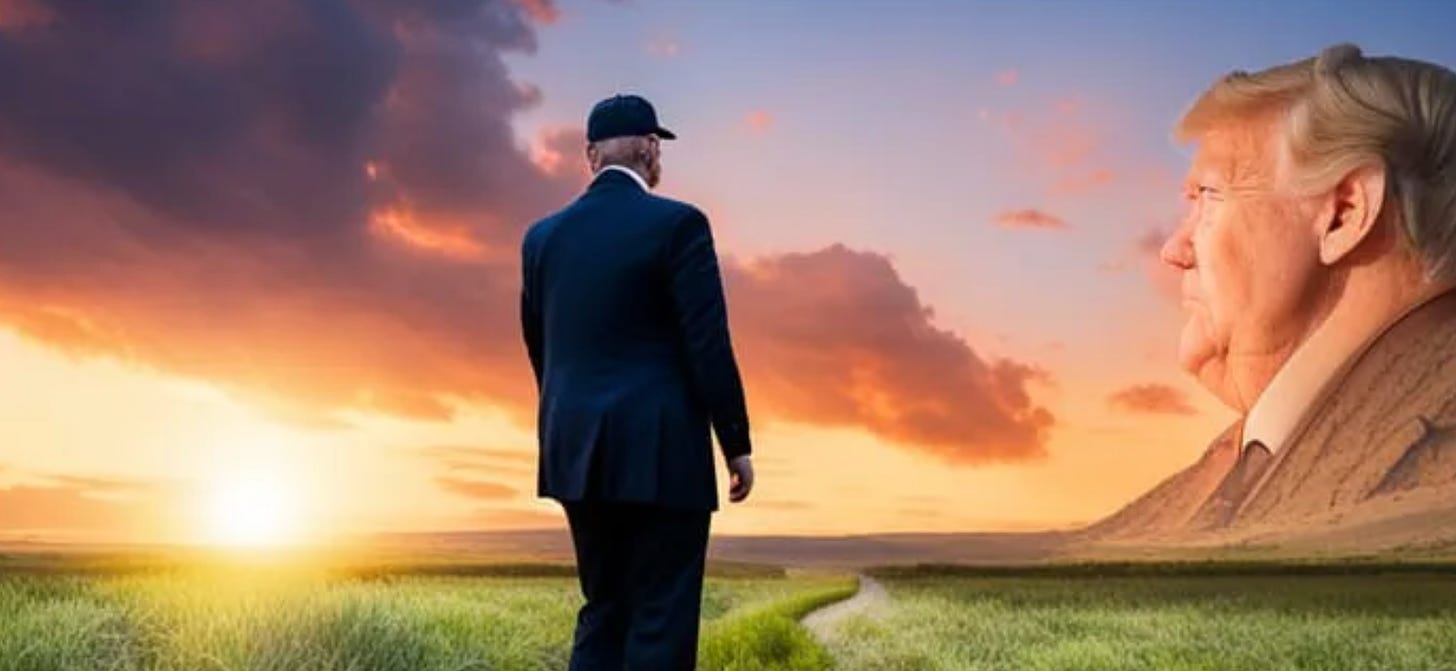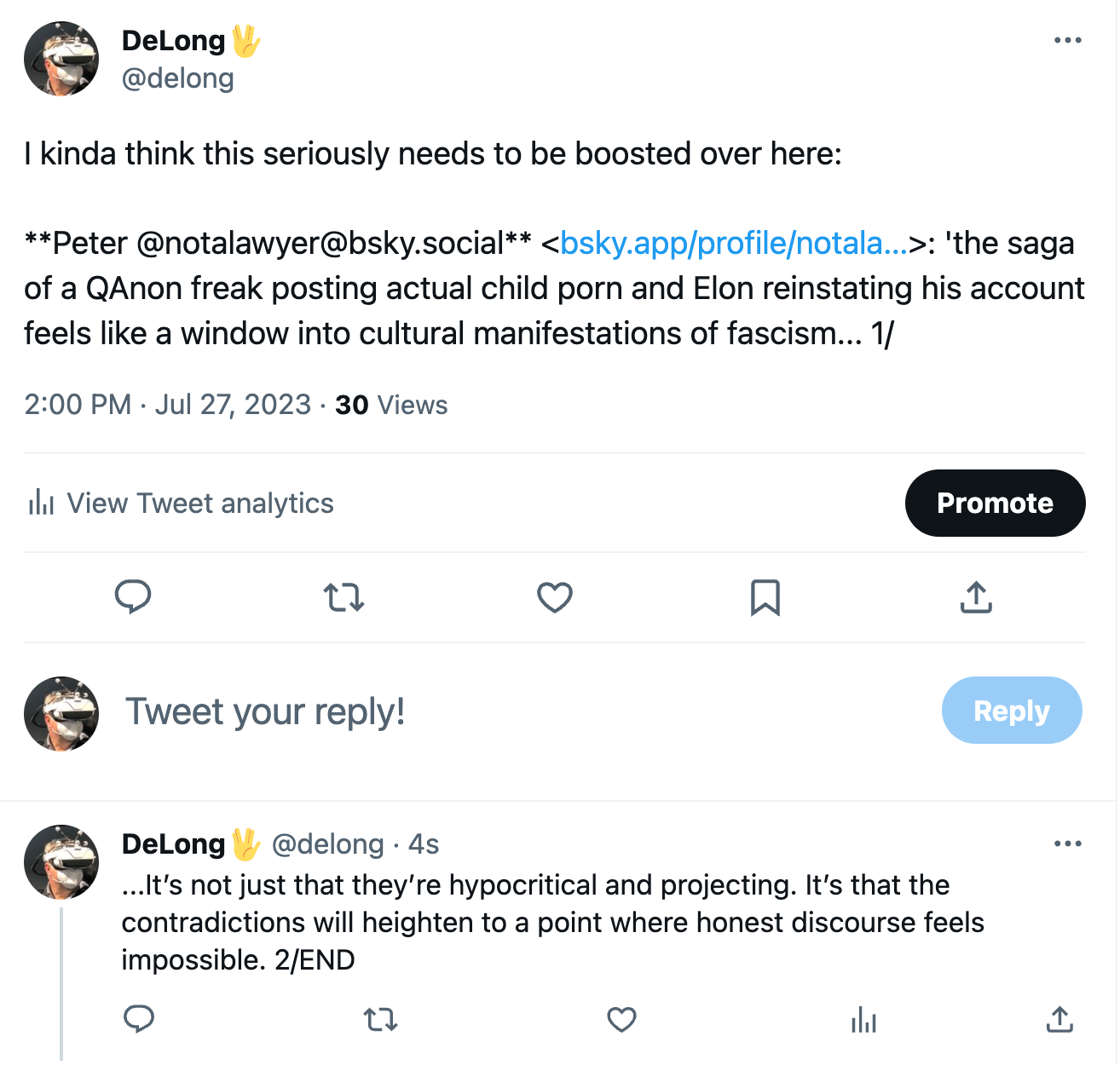BRIEFLY NOTED: For 2023-08-01 Mo
…middle-class college-admission anxiety, élite Chinese Communist Party politics, & þe alien nature of þe pre-revolution Russian literate upper class…
MUST-READ: þe Cruelty Is þe Point, Always:
Charles Dickens’s Ebeneezer Scrooge in A Christmas Carol was a parody: ‘“At this festive season of the year, Mr Scrooge… it is more than usually desirable that we should make some slight provision for the Poor and destitute, who suffer greatly at the present time. Many thousands are in want of common necessaries; hundreds of thousands are in want of common comforts, sir.” “Are there no prisons?” “Plenty of prisons…” “And the Union workhouses,” demanded Scrooge. “Are they still in operation?” “Both very busy, sir…” “Those who are badly off must go there.” Many can’t go there; and many would rather die.” “If they would rather die,” said Scrooge, “they had better do it, and decrease the surplus population…”’ The Texas border is reality?
The Cruelty Is the Point: John Gruber: ‘We Can’t Just Keep Handing Out Water’: ‘Benjamin Wermund and Jhair Romero, reporting for The Houston Chronicle: “Several migrants asked for water but were turned down by troopers who said there was none, even though cases of bottled water were kept at many of the military-like outposts along the river. Olivarez said earlier in the day that troopers are told to use their judgment and discretion when deciding to distribute drinking water. He said the state cannot give a bottle to everyone when 600 to 1,000 people are crossing every day. ‘If they see a child or an adult that looks like they’re suffering from some kind of heat exhaustion, they’ll give them water’, Olivarez said. ‘But we can’t just keep handing out water because what’s going to happen is, you’re going to continue to encourage them to come.’” This is how you know Texas governor Greg Abbott is an idiot—the cruelty in this passage is off the charts. We’re talking about water here, in severe heat. (Via Adam Isacson, who comments, “As if giving water to asylum seekers in a heat wave is like giving bread to seagulls. Just incredible”)…
ONE IMAGE: However Bad You Think X-Twitter Is, It’s Worse:
ONE AUDIO: Martin Wolf: Shifts, Shocks, & Fragilities
<https://overcast.fm/+oiPXdYACk>
The world economy has experienced many shocks over the past few years: A pandemic. Russia’s invasion of Ukraine. Skyrocketing inflation. These are the stories that have dominated headlines — and for good reason.
But they’ve also overshadowed a set of deeper, more fundamental shifts — the rise of China as an economic superpower, the fracturing of trade relations, the realities of the climate crisis — that are transforming the global economic order and prompting ambitious policy responses from leaders across the world.
Martin Wolf is the chief economics commentator at The Financial Times, a former senior economist at the World Bank and the author, most recently, of “The Crisis of Democratic Capitalism. Across his writings, Wolf has developed some of the clearest frameworks for thinking about how the global economy is changing and some of the sharpest critiques of how policymakers are responding to those changes.
We discuss how China’s meteoric economic rise has shaken the foundations of the global economy, why globalization has remained far more resilient than so many predicted, why Wolf is skeptical that President Biden’s industrial policy agenda will succeed, the debate between “onshoring” and “friendshoring” that is dividing the Democratic Party, why a recession in the United States is looking far less likely than it did six months ago, the virtues and vices of Biden’s “foreign policy for the middle class,” why China’s recent economic troubles could signal a more foundational decline, why the U.S. economy has remained so much more stronger than most economists anticipated, and more.
Mentioned:
“The I.R.A. Passed a Year Ago. Here’s a Progress Check” by The Ezra Klein Show, with Robinson Meyer
“The China Shock: Learning from Labor Market Adjustment to Large Changes in Trade” by David H. Autor, David Dorn and Gordon H. Hanson
“Is the Global Economy Deglobalizing?” by Pinelopi Goldberg and Tristan Reed
“Climate Progress and the 117th Congress: The Impacts of the Inflation Reduction Act and Infrastructure Investment and Jobs Act” by REPEAT Project
Book Recommendations:
The Narrow Corridor by Daron Acemoglu and James A. Robinson
Power and Progress by Daron Acemoglu and Simon Johnson
The Rise and Fall of American Growth by Robert J. Gordon
This episode is guest-hosted by Rogé Karma
Very Briefly Noted:
Street-Fighting Math: Wikipedia: ‘The Taylor series for the square root of (1 + x) is: 1 + x/2 - x^2/8 + x^3/16 - 5x^4/128…
Economics: Steve Stecklow & Norihiko Shirouzu: Tesla created secret team to suppress thousands of driving range complaints: ‘\Tesla rigged the dashboard readouts in its electric cars to provide “rosy” projections of how far owners can drive…. The automaker last year became so inundated with driving-range complaints that it created a special team to cancel owners’ service appointments…
Finance: Matt Levine: The APEs Can Be Saved: ‘The class… settled… (1) each APE would convert into one new common share but (2) each old common share would convert into about 1.13 new common shares…. Vice Chancellor Morgan Zurn… rejected the settlement… worried that the settlement released too many claims against AMC…. It’s pretty easy to revise the settlement to accommodate the judge’s concerns… just cross out the words “and/or AMC Preferred Equity Units.” So that’s what they did…
China: Jeremy L. Wallace: Seeking Truth and Hiding Facts: Information, Ideology, and Authoritarianism in China…
Noah Smith: China 2023 Series…
Economic History: Jürgen Osterhammel and Patrick Camiller: The Transformation of the World: ‘Hobsbawm… does not give the nineteenth century (which for him is “long”) a single overarching name but divides it into three: the Age of Revolution (1789–1848), the Age of Capital (1848–75) and the Age of Empire (1875–1914)…
Economic History: Anton Howes: Age of Invention: Water World: ‘Before the rise of the water-powered cotton mills of Lancashire, it was the medieval world that saw a dramatic expansion in the use and application of water for mechanical power…. To the ancients… waterwheels… seemingly… used only on aqueducts… milling flour or raising water for irrigation…. Over the course of the seventh to thirteenth centuries… floating watermills… dams… millraces… adaptation of waterpower to [other] uses… even metallurgy and cloth-making… sawmill… lathe… bor[ing]… crush[ing]… tanning and fulling… bellows… hydraulic stamps…
Building Human Capital: L.A. Paul & John Quiggin: Transformative Education: ‘A successful college education… generat[es] an individual conceptual revolution… through the process of developing critical thinking skills, leading to conceptual replacement and the discovery of new intellectual frameworks. This epistemic transformation, if deep enough, scales up into a personal transformation…
Poetry: Phil H: Tang Poetry…
GPT-LLM-ML: OpenAI: Custom instructions for ChatGPT: ‘We’re rolling out custom instructions to give you more control over how ChatGPT responds. Set your preferences, and ChatGPT will keep them in mind for all future conversations…
¶s:
Building Human Capital: Very striking, but “bias against” is very much the wrong word. Smart students below percentile 95 have increasingly hard times building those high test scores. The class relationship between ultimate potential and admission likelihood is strongly biased increasingly against the poor all the way down; and the class relationship between value added and admission likelihood—ho! ho! ho!:
Derek Thompson: ‘Incredible snapshot of upper-middle-class college anxiety. Elite colleges have affirmative action for the very, very rich. Lower income students, who are less likely to apply, have a small advantage. This cashes out as a clear bias against upper-middle class applicants…
China: I do not understand China’s élite politics under the reign of the Chinese Communist Party. I do not understand network-and-connections politics. There is, on the surface, a fiction that the Party is united in agreement and obedience to the “correct line” of analysis and—a “Rousseauist” fiction that there is a general will that has been ascertained and that all are happy with. And there is a fiction that this general will is incarnate in the paramount leader. There is some sort of balancing-of-factions. And, among the factions, there is some kind of struggle for position-and-power. What divergences of opinion on policy there are “among the people” can very easily and suddenly change as formerly high cadres now become wreckers—“the #1 and #2 persons in authority taking the capitalist road”. Plus, often, “the mountains are high, and the emperor is far”. How legitimate authority is gained and held in such a “Rousseauist” bureaucratic system overlaid with patron-client, patron-patron, and peer-solidarity bonds is beyond me. What role is played by the 8341 regiment of the People’s Liberation Army is not clear. How the rest of the PLA weighs in, and how much decisions of personnel and policy are shaped by a need or a desire to please the Old Hundred Names is also something I do not understand. But Joseph Torigan has very interesting things to say:
Joseph Torigan: Elite CCP Power Struggles: ‘[American] political science… look[s] at authoritarian regimes as… an individual who has a policy platform… patronage… the so-called “selectorate”… convinces some coalition to support them…. [But] it was… personal antagonisms, different views about historical contributions to the revolution and the regime… manipulation of ambiguous rules, the use of compromising information… the cultivation of power ministries and political police in the military…. Hua Guofeng… relied… on the bodyguard regiment under Wang Dongxing 汪东兴 and the military as an ultimate guarantor… [in] the move against the Gang…. Deng Xiaoping was brought back to power in 1975… [because of] views of your contributions to the revolution. During the Cultural Revolution… how soon you rallied to the campaign and how much you contributed…. But since the Cultural Revolution was so widely seen as a disaster, that latter… was problematic…
Russia: The first two paragraphs of War and Peace: they are, overwhelmingly, not in Russian, but in French. Indeed, the first Russian word is the 15th: “поместья”, added to the dialogue out of a fear that the French “apanages”—the equivalent of the English “fiefs”—will not be understandable. And the next Russian words are numbers 69-71: “мой верный раб”—“my faithful serf” (although the meaning is very close to “slave” as well, if I have it right). The Russian literate book-reading class in Tolstoy’s day was assumed to be substantially literate in French. There is a sense in which pre-revolution Russia was a colony ruled by a semi-Frenchified alien aristocracy:
Leo Tolstoy: War & Peace: «–Эh bien, mon prince. Gênes et Lucques ne sont plus que des apanages, des поместья, de la famille Buonaparte. Non, je vous préviens que si vous ne me dites pas que nous avons la guerre, si vous vous permettez encore de pallier toutes les infamies, toutes les atrocités de cet Antichrist (ma parole, j’y crois)–je ne vous connais plus, vous n’êtes plus mon ami, vous n’êtes plus мой верный раб, comme vous dites. Ну, здравствуйте, здравствуйте. Je vois que je vous fais peur, садитесь и рассказывайте. Так говорила в июле 1805 года известная Анна Павловна Шерер, фрейлина и приближенная императрицы Марии Феодоровны, встречая важного и чиновного князя Василия, первого приехавшего на ее вечер. Анна Павловна кашляла несколько дней, у нее был грипп, как она говорила (грипп был тогда новое слово, употреблявшееся только редкими). В записочках, разосланных утром с красным лакеем, было написано без различия во всех: «Si vous n’avez rien de mieux à faire, Monsieur le comte (или mon prince), et si la perspective de passer la soirée chez une pauvre malade ne vous effraye pas trop, je serai charmée de vous voir chez moi entre 7 et 10 heures. Annette Scherer»…


